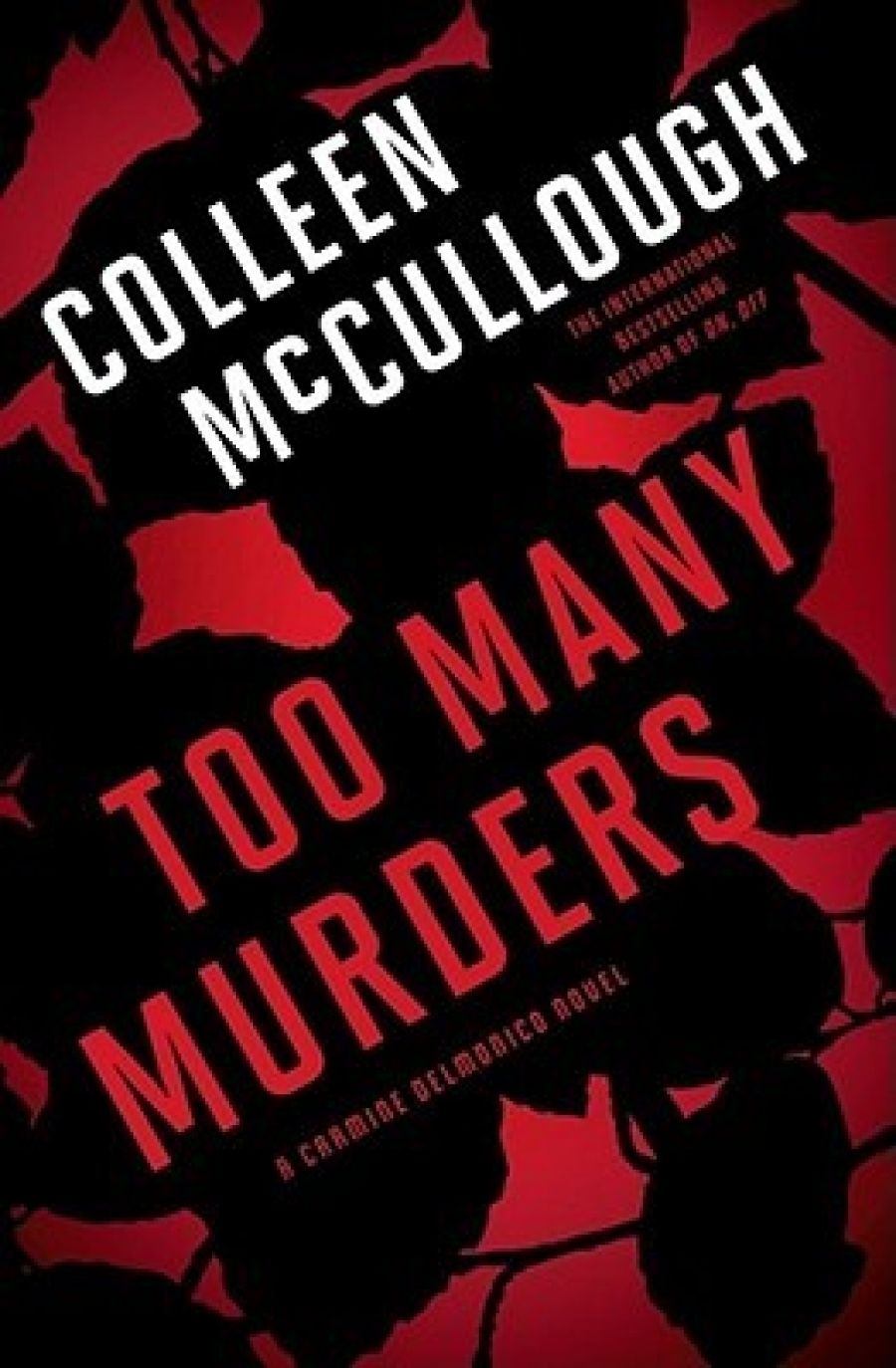
- Free Article: No
- Contents Category: Fiction
- Review Article: Yes
- Online Only: No
- Custom Highlight Text:
A good detective series depends on the author’s ability to devise canny plots with attendant clues and blind alleys, but of greater importance is the central detective who acts as a charismatic guide through the miasma of murder and mystery. There are many compelling detectives in crime fiction: think of Inspector Maigret, Hercule Poirot, Adam Dalgliesh, Kay Scarpetta and Stephanie Plum. However, with the exception of Sherlock Holmes and Dr Watson, and, more recently, Stieg Larsson’s Lisbeth Salander and Mikael Blomkvist, memorable couples are rare in the sleuthing game.
- Book 1 Title: Too Many Murders
- Book 1 Biblio: HarperCollins, $49.99 hb, 371 pp
Colleen McCullough introduced Lieutenant Carmine Delmonico and his beloved Desdemona Dupre in On, Off (2005). Carmine, a stocky, rugged Italian, fell for Desdemona during a spate of murders in his home town, Holloman, Connecticut. Though Desdemona, now married to Carmine, doesn’t work in the police department, she is a constant source of inspiration, good advice and delicious food. In Too Many Murders, Desdemona has given up her job as a business manager. She often consults Carmine’s extensive Italian family about culinary subjects. But Desdemona is no pasta-making ornament. She proved herself in On, Off when escaping the clutches of a sadistic serial murderer. In Too Many Murders, she saves her own life and that of her baby from a masked killer. This feistiness is matched by her startling physical appearance. She describes herself as ‘a sixfoot three Boadicea’. More brutal is one suspect’s description of her as ‘a grotesque’. And Carmine? Carmine calls her his sovereign.
If Desdemona intrigues the reader, so does Carmine, the man who loves her. In the new novel he has been promoted to Captain and soon confirms his reputation as a tough dude. Carmine is publicly called out by an FBI agent in Carmine’s favourite restaurant. In the time-honoured recipe for establishing authority, Carmine takes the agent outside and whacks him. Carmine can also talk tough and noirish when he has to. To the FBI agent he says: ‘You’re still being clever, you bigcity, know-it-all cunt. You piss on my town, you piss on my department – Eat shit!’
Holloman is a city of some 150,000 people. (McCullough, who worked in New Haven as a neurophysiologist when she was young, has clearly been drawn, once more, to this setting.) While Holloman isn’t big enough to warrant a homicide division, Carmine heads three squads of loyal detectives. They come in handy when twelve murders are committed on the same day.
Initially, there seems to be little connection between the twelve murders, except for a tenuous thread between the city’s armaments company, Cornucopia, and the University College of Chubb. At first, Carmine finds it difficult to establish a link. If the murders are connected, how could they have been executed on the same day? Were some of them incidental to a grand scheme? The deaths are grim, various and graphic. A college student, caught in a huge bear trap, slowly bleeds to death; the Cornucopia owner is tortured with a soldering iron; a prostitute has her throat cut, almost decapitating her.
Carmine assiduously interviews suspects. Along the way we get snap portraits, the sort that make the genre so enjoyable. Carmine observes his suspects keenly. ‘The suit was wool from Savile Row …’ The black eyes which find it hard to settle, ‘… not because they hunted for a mirror, but because they had things to hide’.
After a considerable amount of digging, Carmine discovers that Cornucopia is hosting a spy, code named Ulysses, who is selling secrets to the Russians. Could he be connected to the murders? McCullough has done her homework, as always, and mines the golden days of the Cold War and the FBI, always helpful to thriller writers. The era allows her to return to the whodunit genre of detective fiction when attention to detail, observation and deduction were important tools for the detective, rather than computer databases and DNA analysis.
Too Many Murders does not strive for the dark, literary edge of, say, Peter Temple’s crime novels, but it does hold a respectable middle ground in the crime fiction pantheon. Characteristically, McCullough’s writing maintains a rigorous tension; one of the most underestimated skills of the storyteller’s craft. The basis of this suspense is ultimately due to our interest in Carmine and Desdemona. We are keen to find out whether justice will be done, not so much for the sake of law and order and the American way, but because that justice is vital to Carmine and Desdemona.


Comments powered by CComment